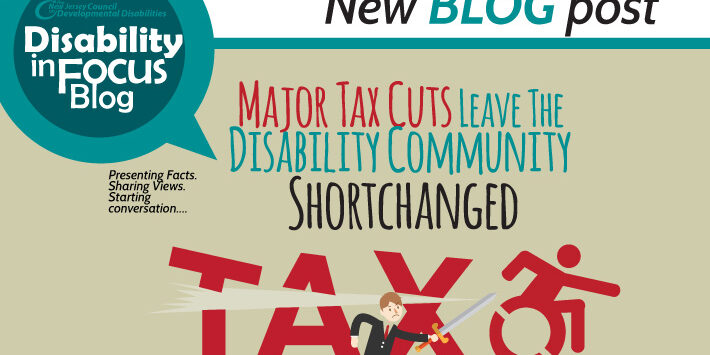By: Jeremy Einbinder
With 2018 underway, the Trump administration continues to celebrate the passage of the first major tax reform in decades. While there are some aspects that could plausibly be seen as positive for less affluent people, the wealthiest Americans stand to benefit the most in the long term. However, Americans with disabilities would be hard-pressed to find one redeemable provision of the bill that benefits them at all.
The Center for American Progress reported before the bill’s passage,
“Following myriad failed attempts to repeal the Affordable Care Act, Congressional Republicans have decided to squeeze their attacks on health care into their tax plan. The Senate version of the bill would repeal the ACA’s individual mandate. According to the nonpartisan Congressional Budget Office, this would drive up premiums by 10 percent in 2019 and result in 13 million fewer Americans with health insurance by 2025. The Center for American Progress has estimated that the typical middle-class family buying health insurance on the individual market would see its premiums balloon by nearly $2,000 per year, putting vital care out of reach, including for many individuals with disabilities.”
The current government continues to paint the Affordable Care Act as a colossal failure, the bulk of which could only remain due to differing views of what was the appropriate number of people from whom to take away healthcare. The question that continues to go unanswered is how anyone could think it was a good idea to move from a situation in which 13 million people have health insurance, to a situation in which 13 million people do not have health insurance.
The report continues, explaining that a key provision in the tax plan would eliminate the medical expense deduction. The Center for American Progresses concluded that,
“Eliminating this deduction would be especially devastating for people with disabilities and severe illnesses, who frequently face thousands or even tens of thousands of dollars in out-of-pocket medical costs for long-term supports and services. It could put critical home- and community-based services and even life-sustaining treatments out of reach, pushing people out of their communities and into costly, isolating institutions, bankruptcy, or both.”
Home and Community Based Services (HCBS) are some of the most crucial institutions for the disability community, and the Council has made a point to emphasize the importance of direct support professions on multiple occasions. Any law that puts those kinds of programs in jeopardy risks weakening the ability to ensure the disability community knows the importance of inclusion and properly advocates for it.
The disability advocacy site, The Mighty, gave a very grim aspect of what lies ahead for people with disabilities who require much higher medical costs than average, explaining that Medicare stood to lose $25 billion in funding, a huge loss for the elderly and people with disabilities who depend on it. The bill will also cause the individual mandate of the Affordable Care Act to be removed. The Mighty warns, “Without the mandate — which ends as of 2019 — analysts are concerned that healthy people will leave the marketplace and, by forgoing penalty, will leave Obamacare without adequate funding, further increasing premiums and deductibles.”
Public outcry from activists like Ady Barkan, who has ALS, was not enough to stop the innocuously named Tax Cuts and Jobs Act from passing in the last days of 2017. The Huffington Post reported that,
“Barkan and hundreds of like-minded activists had centered their opposition to the tax bill on the cuts it could generate to essential social programs.”
The TCJA will add and estimated $1.4 trillion to the debt, which Barkan and other activists feared will trigger pay-as-you-go, or ‘Paygo”, rules ― resulting in across-the-board spending cuts to programs like Medicare that Barkan will depend on as his ALS progresses.
“Specifically, Barkan will need an expensive ventilator and the near-constant help of professional medical staff in the coming years,” the Huffington Post said.
It seems hard to believe that any government official could hear constituents say to them that the passage of a bill for which they and their colleagues are so stridently advocating could result in premature death for millions of people. However, there are quite a few documented instances of citizens with disabilities telling their representatives what amounts to “This bill will directly cause my death,” to no avail. Activists chanting “Kill the bill! Don’t kill us,” left supporters of the TCJA unmoved, and claiming that our country simply cannot afford to provide citizens with healthcare. This is a dubious claim, considering that many of people the TCJA affects are people who previously had healthcare before its enactment. William Gale, co-director of the non-partisan Tax Policy Center, fears that the government is not done finding ways to strip resources from people who clearly need them:
“…It would not be surprising to me if they went after entitlement programs as the next step,” Gale posits, “But if they make claims that the nation can’t afford the programs, that should be seen as hypocrisy, given the tax cuts they have all just voted for.”
In other words, the resulting passage of the bill means to its proponents that taking services away from a group of people who are universally agreed to be among the most disadvantaged is justified in order to enrich the already wealthy and powerful.
Share This Article







